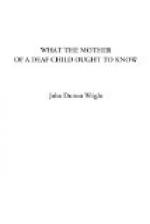Third. The avoidance of becoming dependent upon some one as an interpreter, and the cultivation of independence and self-reliance through constant practice with various teachers.
Fourth. A fully equipped and trained organization, providing a complete and uninterrupted education under one head.
Fifth. Regularity of life, and the subordination of all living conditions to the highest educational advantage (a thing utterly incompatible with home conditions).
These most necessary conditions are not possible of attainment through private instruction in the home. The child who is kept at home and given private instruction too often grows up to be timid, self-distrustful, and unfitted to cope with the difficulties and oppositions of the world. He falls an easy prey to temptation and is quickly discouraged by obstacles. Very often he is selfish, narrow, and overbearing. Not having those about him of his own age and with the same desires, he has become accustomed to having people yield to his whims and fancies as child playmates would not yield. He is more or less excluded from the plays and pleasures of childhood. All those about him have an advantage over him.
On the other hand, the tendencies of the school-bred child are to be simple, natural, and childlike. His inclination to moodiness and suspiciousness is much less. He is happier. He becomes self-reliant, independent, and respectful of the rights of others. He is less petulant and more obedient. The wisest parents do not educate their hearing children at home, nor should they attempt it with a deaf child.
XXII
IMPORTANCE OF THE BEGINNING
I wish to lay very special stress upon the necessity at the beginning of the most expert and experienced instruction that is attainable. If circumstances make it impossible to give to the child the best all the time, then he should have the best at the start rather than later. Every effort and every sacrifice that are ever going to be made for the child’s sake should be at the beginning of his school training, and not delayed till he is older. The years from five to eight or ten will determine his future success. If he has poor teaching during these early years, even the best teaching later will not be able to make up the loss entirely. But if he has good teaching during the first few years, then less expert teaching later cannot do him as much harm as it otherwise would. The early years are his most crucial period, and the best efforts should be expended then instead of when he is twelve or fourteen.
XXIII
AVOID THE YOUNG AND INEXPERIENCED TEACHER




